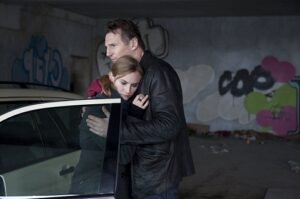Unknown

For a fine actor who has played everyone from Oscar Wilde to Alfred Kinsey with great acclaim, Liam Neeson seems to have embarked on a new career of making one cheesy bomb after another. Maybe he’s bored. Maybe he just wants to soak up the money and throw in the bathmat. Maybe he needs to give up the notion of being a movie star and return to the stage. Maybe he needs a new agent. Whatever the reason, he’s giving everyone a punch on the jaw with movies like The Next Three Days, The A-Team, Clash of the Titans, After Life and Taken. Now, instead of a return the earlier glory of Schindler’s List, he delivers a dopey, incomprehensible muddle called Unknown—a title that best describes the reason it wasn’t left on the cutting-room floor.
Unknown is a bad movie that starts out as a good movie, then plunges steadily downhill in a pile of head-scratching mush. In the warp-speed world of contrived thrillers, this one moves along satisfactorily for close to an hour, sucking us into an alternate-reality case of mistaken identity, until it chokes on its own red herrings. In the second hour, there are so many holes in the script it looks like a New York street after a snowplow. Mr. Neeson plays a noted scientist from New Hampshire named Dr. Martin Harris who arrives in a snowy Berlin with his lovely wife Liz (January Jones from TV’s “Mad Men”) to address a global summit on bio-technology. While they are getting into a taxi at the airport, the briefcase containing Dr. Harris’ speech is left on the curb. While Liz is checking them into the posh Kempinski Hotel, he remembers the missing bag and without telling his wife, simply grabs another taxi to the airport that plunges from a bridge into an icy river. When he awakens in the hospital after a four-day coma without any memory or identification, a sympathetic nurse tries to help. Arriving at the hotel, he finds Liz with another man (Aiden Quinn) who has claimed his identity. “Liz, I’m sorry, I was in an accident, they didn’t know who I was,” he pants, to which his wife coldly replies, “Excuse me…do I know you?” Returning to the hospital, his kind nurse recommends a friend who specializes in finding missing persons, and is then murdered by the mysterious figure who has been stalking him in the subway. Now Martin is not only a man without a passport, but a hunted murder suspect in a strange country. (He doesn’t know his name, but he knows the foreign dialing codes, always has the correct change, and never runs out of money in either American dollars or German marks.) To prove his identity, he turns to the person whose address is scrawled on a piece of paper in his coat—a former member of the East German secret police—and the Bosnian cab driver (Diane Kruger, from Quentin Tarantino’s Inglorious Basterds) who pulled him from the river and is now hiding from the police as an illegal immigrant. Enter Dr. Harris’ best friend from New Hampshire (Frank Langella) who brutally murders the retired former Communist agent (huh?), as well as a gang of villains out of an old Nazi picture starring the Bowery Boys. It’s amazing how everyone in Berlin suddenly speaks fluent English. When the terrorists (who knock off half of Berlin for unexplained reasons) burst into Ms. Kruger’s apartment where Mr. Neeson is hiding out, he’s in the shower naked, but by the time they burst into the bathroom, he’s climbing over the roof in the snow, apparently wet and barefoot, but unfazed. By now, Unknown has turned inadvertently into a comedy. Careening through the traffic in a city he’s never been in, but knowing exactly where he’s going, the doctor discovers there is no such person as Dr. Martin Harris, his enigmatic wife Liz and the man who has stolen his identity are both imposters, and even the confused doctor himself is…never mind. Just rest assured that each time you think you’ve got it all figured out, there’s always another preposterous plot twist on the way.
I can fully understand why gorgeous January Jones would want to parlay her success on “Mad Men” into a big-screen career, but Unknown is not the movie that is going to do it. Lamely directed by Spain’s Jaume Collet-Serra from a script by Hollywood hacks Oliver Butcher and Stephen Cornwell that borders on dementia, there isn’t one two-minute segment of this scrambled chaos that holds up under even the most basic scrutiny. No movie stops making sense in post-production. Jabberwocky begins with the screenplay. Unknown makes no sense at all, so you not only worry about Liam Neeson’s judgment in movies, but you begin to wonder if he’s forgotten how to read.
Vanishing on 7th Street

Vanishing on 7th Street is the latest cryptic pseudo-sci fi hologram by shockmeister Brad Anderson (The Machinist), a director more interested in effects than the reasons for them. It begins in a movie multiplex where a lonely projectionist (John Leguizamo) rolls spools of film through a lens darkly when the cinema goes totally black. Roaming through the seats, he discovers the audience has vanished, leaving their coats and popcorn in the empty seats. Director Anderson used to work as a projectionist after graduating from Bowdoin College in Maine, so he’s just doing what comes naturally. I don’t know what accounts for the rest of the movie. The power is out all over town, the streets are filled with discarded cell phones and abandoned cars with dead batteries. Everything is fading, including photographs, erasing all proof of the existence of human life. The sun is shrouded in blackness. A noxious shadow creeps across every wall and sidewalk. Nuclear attack? A judgment from God? As the days pass, daylight hours are reduced. The only living things that survive are those who cling to some alternate form of light.
Still breathing during this mysterious calamity is a desperate group gathered inside an old saloon powered by an emergency gas generator: the paranoid projectionist, a vain and pompous TV personality (Hayden Christensen, who has matured nicely since his brush with Star Wars ) forced to live by his wits for the first time without an audience, a distraught doctor (Thandie Newton) whose child is missing, and a shotgun-toting black kid (Jacob Latimore) waiting for his mother to return. To stay alive, they must join forces to find alternate sources of light and a way out of the city, while avoiding being touched by the menacing, moving shadow that destroys everything in its path. Alien abduction? A black hole in the universe? Divine punishment for man’s earthly sins? The action in Anthony Jaswinski’s mordant script involves darting from one light source to the next and the direction consists mainly of movements lit by matches, cigarette lighters, torches, a truck’s dying headlights, and a flashlight with a dying battery. Under the circumstances, you find yourself rubbing your eyes a lot in need of an opthamologist and blinking like you have a nervous disorder. Mr. Anderson has evidently watched a lot of old “Twilight Zone” re-runs. So much of the film’s dense, murky palette evokes menace without mayhem, but the wrap-up at the end by Rod Serling is sadly missed. The actors work hard to convey terror–especially Mr. Christensen, who proved he could act when he played disgraced journalist Stephen Glass in the marvelous, underrated Shattered Glass—but the panic that overtakes the characters never quite grips the audience. Ultimately it weakly questions the reason for existence, but Vanishing on 7th Street doesn’t make much of a point. On the screen, the night never ends, but luckily, the anxiety is over in 85 minutes and outside the cinema, daylight awaits.
The Chaperone

In the bank robbery business, a “wheel man” is a skilled driver of getaway cars whose services are in great demand. An uneven but surprisingly pleasing and often entertaining low-budget indie-prod called The Chaperone is about an accidental wheel man named Ray Bradstone who lost his freedom, family and self-respect in a heist that landed him seven years in prison. Now he’s getting out and determined to make amends, pay his debt to society, and start fresh. Ray heads home to his well-kept brick house in the neatly manicured suburbs to catch up with his wife, who wants him to turn around and leave, and his embarrassed, ashamed and hostile daughter, who just wants him to drop dead. The movie is about the comical, cultural and criminal repercussions when Ray signs on as a chaperone on his daughter’s junior-high classroom field trip to New Orleans. Here’s the big surprise: Ray is played by 13-time world championship wrestling superstar Paul “Triple H” Levesque. He ain’t bad.
Unable to find a job in a skeptical society wary of ex-cons, Ray says things like “Failure is a self-fulfilling prophecy”, but turns out of necessity for one last stickup with his old gang, but gets an attack of moral conscience and cold feet at the last minute, running away while the crooks are inside the bank wearing Halloween masks from the Bush administration. The movie sometimes falters in its comic targets (a silly bank teller tells the cops “I almost don’t mind being robbed by a man in a Condoleeza Rice mask. I like a guy with a sense of humor”) but the thieves on the run who think Ray has double-crossed him don’t laugh, and Ray finds himself pursued by a pack of angry thugs, an army of cops, and unknowingly carrying the stolen bank money. With his massive center-ring frame, Mr. Levesque takes up most of the screen’s dimensions, but he has an appealing gentle-giant way with kids, and can say a dramatic line with unexpected tenderness. On his journey to redemption, he dodges spitballs and cherry bombs, does a good deed that wins the admiration of the school, polishes his parenting skills, tries to be a role model for moppets, and repairs the ruptured relationship with his daughter while dispensing cracker barrel philosophy like “Life is like a raging river—you never know what is around the next bend. You just make sure our boat doesn’t leak and go with the flow.” OK, some of the dialogue is so cute you want to yell “Ouch”. But the too-neat payoff wins over his estranged daughter and all of her egghead friends, who use their iPhones and the book “Cellphone Jungle for Dummies” to rescue her Dad from a colorful storage warehouse for Mardi Gras floats. (Did I forget to mention the film also presents the best postcard view of New Orleans since Hurricane Katrina?)
Happily, the direction by Stephen Herek (Mr. Holland’s Opus, 101 Dalmations) finds the perfect way to distill the unexpected charms of his star. The obvious thing for a tattooed muscle man with a ponytail would be to play has-been fighters or goons with cauliflower ears, but Mr. Levesque has chosen a role with warmth, range and sensitivity, and even sings a few bars of the Fred Astaire classic, “Pick Yourself Up”. When the kids take over, the movie gets sloppy. But as long as the poker-faced “Triple H” is the centerpiece, The Chaperone is not without moments of genuine sweetness. Best of all, he is the most unpretentious and least flamboyant human juggernaut who ever hit the screen. Think Arnold Schwarzenegger in Kindergarten Cop, but better.
